
Agnès Benet - PhD in underwater biology
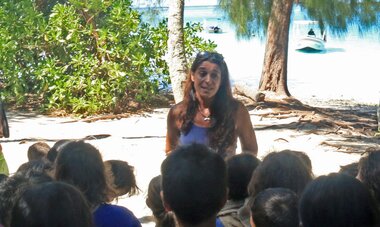
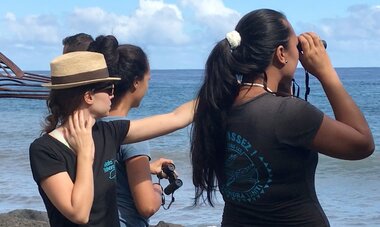
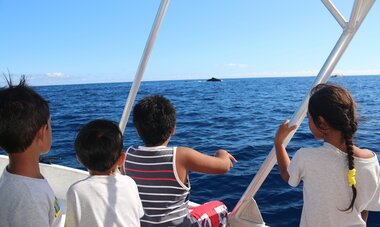



Agnès Benet
The ocean has been running through Agnès Benet's veins since her childhood. Born near the sea in metropolitan France, it is this family passion that inspired her career. Today, Agnès Benet has a PhD in underwater biology and is specialized in the study of marine mammals and coral reefs. She especially studies the behavior of animals and the environment in interaction with human activities.
Her love for these fascinating and vulnerable marine species led Agnes to settle in Tahiti and to found the association Mata Tohora, which means "The Eye of the Whale" in Tahitian. She also established an annual event, Whale Day.
In addition to this annual event, the Mata Tohora association strives to inform the local population, visitors, and professionals (fishermen, tourism service providers, etc.) about the proper ways to protect the various species of whales and dolphins living in Polynesian waters.
« Whales and dolphins have a real Mana, a particular energy .»
To ensure their well-being, and not to disturb the humpback whales and all marine animals, it is essential to practice only respectful observations. You will find all the necessary information on the Mata Tohora website. Respect and understanding of wild animals are essential to explore the islands without disturbing their fragile ecosystem.
Discover French Polynesia through the eyes of Agnès Benet.
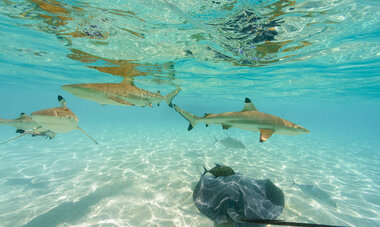
Go snorkeling or scuba diving
The Polynesian Ocean and lagoons are teeming with life. Whether you go snorkeling or diving, fish, sharks, rays, dolphins, and coral will be waiting for you in every island.
To observe marine animals, Agnès Benet recommends diving centers such as Eleuthera in Punaauia to discover the most beautiful spots in Tahiti. She also recommends the atolls of the Tuamotu Archipelago: "The atolls are very specific environments, places that are like no other, with an incredible abundance of biodiversity. I would particularly recommend Tikehau or Fakarava, with its southern channel, classified as a biosphere reserve by UNESCO. It is really an exceptional place for snorkeling or scuba diving. [...] I really advise divers and ocean lovers to see both types of islands (high and atolls), which are so different."
The scientist also reminds us that this is a fragile environment, which should be preserved at all costs. So, for example, be careful not to damage the coral with a fin, because it grows back only a few millimeters per year.
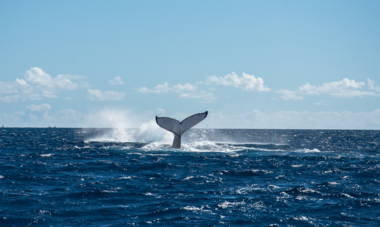
Whale watching from land
To avoid disturbing these majestic animals, there is an excellent solution: observe them from the islands! You will find several viewpoints in French Polynesia, but the most exceptional one is on the humpback whale island, Rurutu, in the Australs Archipelago south of Tahiti. "A route allows you to drive all around the island, and to stop at specific spots facing the sea and bays to observe the whales without disturbing them. You can see them very well with binoculars or with the naked eye, and you can take your time. Often, we notice that the whales themselves go around the island. So, if we circle the island too, it's great, we can see them all day long."
Other whale watching points exist in different islands, "in Moorea, at the viewpoint of Temae, and in Tahiti where you can see them from time to time at the top of Tahara'a, between Arue and Mahina".

Observe marine mammals from a boat
For a closer look at the whales, you can try the boat tours, available on different islands. "We must insist on respectful animal watching. In order to ensure the most eco-responsible observations possible, we have established the Mata Tohora label. You will find several service providers with this label, who are especially careful to respect the animals." Among them, Tohora Bora Bora organizes labeled whale watching: "He offers very nice tours. He is lucky, because he has already seen orcas several times, which is quite exceptional! In Bora Bora there are a lot of marine mammals: humpback whales, killer whales, sperm whales... That's where we see them the most.”
The humpback whale season takes place between July and November in French Polynesia. Some species of dolphins, on the other hand, are generally present all year-round. This is the case of spinner dolphins. You can observe them while scuba diving or during boat cruises.
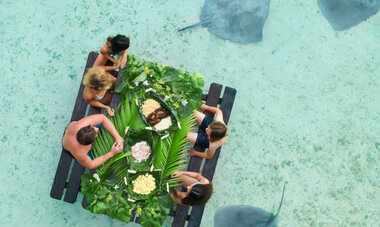
Have a picnic in the middle of nature
At the beach or in the mountains, there are plenty of places to have a delicious picnic. It's up to you to choose the setting for your lunch in Paradise. "I love to picnic on the Tahitian peninsula, or in Moorea, on Temae beach which is very beautiful and easily accessible."
Indeed, if the ocean and the lagoon are often the main reason for traveling to French Polynesia, the green mountains of the Islands of Tahiti also seduce visitors at first sight! "I often go to the lookout (Belvédère) to take a short walk and have a picnic in the mountains. I always like to be in the heart of nature, away from everything. What's great about French Polynesia is that whether you're in the mountains, on land, or at sea, there's a very special luminosity, the light is magnificent."
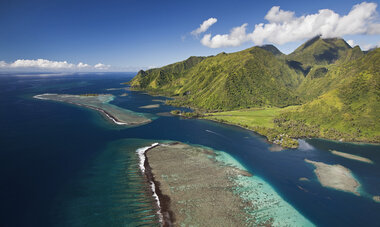
Visit Te Pari in Tahiti
In the mountainous islands of French Polynesia, hiking opportunities are numerous and offer exceptional scenery, challenges, and views. However, one of them stands out for Agnès Benet: Te Pari, on the peninsula (Presqu'île) of Tahiti. Cliffs overlooking the ocean, rivers, lush vegetation, waterfalls, caves and rivers follow one another during this unique adventure.
From Teahupo'o at the end of the road of Tahiti, a taxi boat will take you to the starting point of this exceptional hike, in the most preserved uninhabited area of the island. "Of course, you must have perfect weather and physical conditions to do this, but it is truly fabulous. There, it is really the other end of the world, very unspoiled and natural. It is the perfect place for nature lovers."

